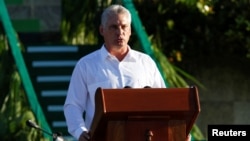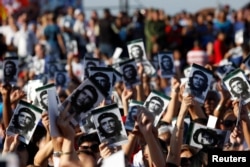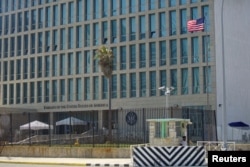The man forecast to replace Cuban President Raul Castro early next year rejected U.S. demands that the Communist-run country change its political and economic system.
In a Sunday speech blasting U.S. pressure on the Venezuelan government and what he termed an effort to discredit the Cuban tourism industry, First Vice President Miguel Diaz-Canel said these and other recent events in the region proved "imperialism can never be trusted, not even a tiny bit, never."
Diaz-Canel was quoting Ernesto Che Guevara at a ceremony commemorating the 50th anniversary of the death of the revolutionary who had helped lead a Bolivian uprising modeled after Cuba's.
"Cuba will not make concessions to its sovereignty and independence, nor negotiate its principles or accept the imposition of conditions," Diaz-Canel said, apparently responding to U.S. President Donald Trump's recent statement at the United Nations that sanctions would not be lifted until the Caribbean island restores democracy and capitalism.
"The changes needed in Cuba will solely be carried out by the Cuban people," Diaz-Canel said.
Castro, 86, has announced he will step down as president in February. Experts expect Diaz-Canel, 57, to become the first head of state since the early 1960s without Castro as a last name.
There are no direct elections in Cuba for national office.
Trump said in June that he would once more tighten sanctions on Cuba and seek a better deal from the country than the gradual detente achieved by predecessor Barack Obama.
The Trump administration has drastically reduced staffing at its embassy in Cuba and ordered a reciprocal reduction of Cuban diplomats in Washington due to a series of alleged "health attacks" on U.S. personnel in Havana.
The United States has not blamed Cuba for the still unsolved incidents but holds it responsible for not protecting its personnel. The administration has also issued a travel warning stating U.S. citizens might be targeted.
"Some unnamed officials are propagating unusual nonsense without any evidence, with the perverse aim of discrediting the impeccable reputation of our country as a safe destination for foreign visitors, including from the United States," Diaz-Canel said.















